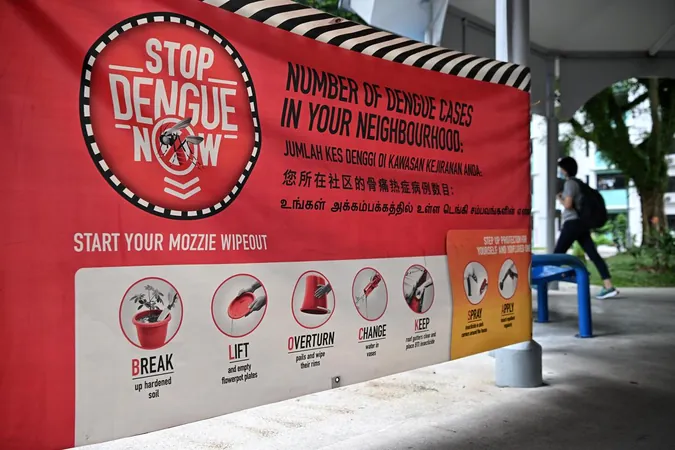
Shocking Surge: Over 13,600 Dengue Cases in Singapore in 2024 – A 36% Rise!
2025-01-08
Author: Yu
SINGAPORE - Dengue Outbreak Escalates Dramatically
The dengue outbreak in Singapore has escalated dramatically in 2024, with more than 13,600 confirmed cases, marking a staggering 36% increase from the previous year's count of 9,949 cases.
This alarming rise highlights significant public health concerns, but the National Environmental Agency (NEA) notes some positive developments. Thanks to initiatives like Project Wolbachia and the unwavering vigilance of the community, larger outbreak clusters have been effectively mitigated. Despite a high baseline of dengue cases and a low population immunity rate, the midyear surge remained relatively contained.
Project Wolbachia: A Fighting Chance Against Dengue
Project Wolbachia, which began in 2016, introduces a bacterium called Wolbachia into male mosquitoes. When these genetically modified males mate with females, their eggs are rendered unviable, gradually reducing the overall mosquito population in high-risk areas. This innovative solution has shown promise in fighting the dengue menace, but continued efforts are essential.
Current Situation: Active Clusters and Hotspots
In recent weeks, between December 29, 2024, and January 4, 2025, there were 110 new dengue cases, an increase of 39 from the previous week. Currently, 14 active dengue clusters have been identified, with three classified as high-risk areas due to having 10 or more cases. Notable hotspots include Bedok, Sixth Avenue, and Ang Mo Kio.
Serotype Concerns and Low Immunity
The NEA has reported that the dengue virus serotype 2 (DenV-2) has been the most prevalent since September 2023, following previous dominance by serotypes 1 and 3. The agency warns that the population's immunity remains low across all four serotypes, raising concerns about the potential for further spikes in cases if preventive measures falter.
Expert Insights on the Increase
Professor Paul Tambyah, the immediate past president of the International Society for Infectious Diseases, pointed to the serotype switch as a significant factor contributing to the increase. "Whenever there is a serotype switch, many in the population lack immunity to the new strain. This results in more symptomatic infections," he explained. The exceptional heat experienced in 2024, which made it one of the hottest years on record, likely also heightened mosquito activity, compounding the risk of infection.
A Call to Action for the Community
In light of these developments, the NEA emphasizes the importance of community involvement in dengue prevention. Citizens are encouraged to eliminate stagnant water sources and uphold stringent housekeeping standards to thwart mosquito breeding.
Looking Ahead: Urgency for Awareness and Action
Given the upward trend in dengue cases and the potential impacts on public health, experts stress the urgency for Singaporeans to stay informed and proactive. Will this alarming trend lead to an outbreak of epic proportions? Only time will tell, but the call for action is clearer than ever!



 Brasil (PT)
Brasil (PT)
 Canada (EN)
Canada (EN)
 Chile (ES)
Chile (ES)
 Česko (CS)
Česko (CS)
 대한민국 (KO)
대한민국 (KO)
 España (ES)
España (ES)
 France (FR)
France (FR)
 Hong Kong (EN)
Hong Kong (EN)
 Italia (IT)
Italia (IT)
 日本 (JA)
日本 (JA)
 Magyarország (HU)
Magyarország (HU)
 Norge (NO)
Norge (NO)
 Polska (PL)
Polska (PL)
 Schweiz (DE)
Schweiz (DE)
 Singapore (EN)
Singapore (EN)
 Sverige (SV)
Sverige (SV)
 Suomi (FI)
Suomi (FI)
 Türkiye (TR)
Türkiye (TR)
 الإمارات العربية المتحدة (AR)
الإمارات العربية المتحدة (AR)